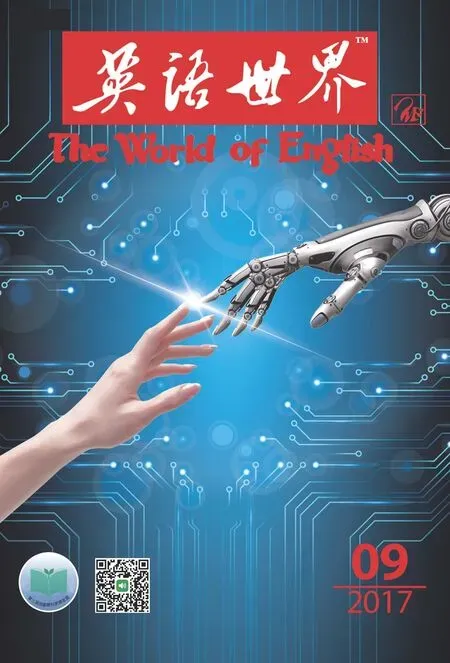翻译擂台(第17期)
2018-01-08林巍
【原文】
[1]沈从文在上海中国公学教书时,对女学生张兆和情有独钟,于是开始不断给她写情书。张兆和出身江南名门,人又漂亮,身后不乏追求者。[2]她觉得老师追学生,很“不正经”,于是告到了校长胡适那里。[3]胡适笑着对她说:“这有什么关系?他又没结婚。”张兆和无言以对。[4]临走,校长对学生说:“我知道沈从文顽固地爱你!”[5]经过沈从文四年的不懈努力,这对师生终成伉俪。这也成为中国文坛的一段佳话。
【点评】
沈从文,中国著名的小说家和文物学家;虽学历不高,但才情很高。他的《边城》自然、缠绵、细腻,几近获得诺贝尔文学奖。他与张兆和的恋情与婚姻,历来为人们所乐道。
[1]中,中国公学于1906年4月10日在上海开学,1912年中华民国成立后又得到了孙中山、黄兴、宋教仁等的支持,曾改名为民国大学、中国大学,又有北京中国公学、重庆中国公学等,故根据其性质,“上海中国公学”不妨译为the Chinese National University (Shanghai)。
对“情有独钟”,参赛者有各种译法,如fell in love with her、gave/show special preference/favor to (her)、had a crush on her、had a soft spot for her等,这里不妨稍加解析。fall in love with sb.一般加上at first sight指一见钟情。preference的本义为a predisposition in favor of something,多指物,如:①As a student of high school, she gave special preference to the subject of physics.(她上中学时,特别喜欢物理课。)②中国古代文人对酒情有独钟,宋代女词人李清照与酒也有很密切的关系。(Ancient Chinese literati showed preference to wine, including female poet Li Qingzhao in the Song Dynasty.)crush on sb.本义为temporary love of an adolescent,多用于年轻人之间带有冲动的恋爱,如:Every girl on the campus has a crush on those handsome boys.(校园里的每个女孩都有自己迷恋的潇洒帅哥。)而have a soft spot for亦多指事物,如:Children usually have a soft spot for sweeties.(儿童一般喜欢吃糖果。)即便指人,一般也是泛指,如:He has a soft spot for pretty girls.(他见了漂亮女孩儿就走不动道了。)故这些用在此处都不很恰当。
就单相思而言,carry a torch for倒是可以考虑,其义为“to be in love with sb., especially sb. who does not love you in return”,但又不完全符合当时情景(因张当时只是碍于师生关系);相比而言,affection更为恰当,其本义是“a positive feeling of liking; a feeling of liking or caring”,而affection与love的关系是:Love is a special affection for a man or a woman, which is stronger than that for any other person.(爱情是对某个男人或女人比对其他任何人都更为强烈的特殊好感。)
对于“名门”,有的参赛者用了blue blood,该词指“a member of the aristocracy; from a royal or noble family”,即欧洲的贵族,似不大符合国情。silver spoon in the mouth可以考虑,如:She was born with a silver spoon in her mouth and has never done a day’s hard work in her life.(她出生于富贵人家,一生中从未做过一天苦活儿。)更多的参赛者用了renowned ancestry、legendary/prominent/famous/prestige family等,似都可以接受。还有一词无人问津——estate,指较高的社会地位,如:The new medicare reform appeals to people of estate.(新的医疗保险改革受到上流社会的欢迎。)至于“追求者”,有的参赛者用了suitor,其义为a man who wants to marry a particular woman,即“求婚者”,似太早了些;而admirer又太有距离感,该词释义为“If you are an admirer of someone, you like and respect them or their work very much”,如:She is an admirer of his paintings.(她是他画作的粉丝。)其中未必有情爱。此处更确切的,应为wooer、hunter、quester、pursuer等。
故[1]不妨译为:While teaching at the Chinese National University (Shanghai),Mr. Shen Congwen reserved a special affection for a female student, Zhang Zhaohe, whose family was of a high estate in the south of the Yangtze River, and her beauty had attracted quite a number of wooers.
[2]中,前文的“于是开始不断给她写情书”不妨调整到这里,以与后文形成因果关系。“情书”,许多人用了love letters、sugar reports等,固然不错,但在文学作品中更多用的是billet-doux,该词源于17世纪的法文。
对于“不正经”,有的用了misconduct,该词意为“unacceptable behavior, especially by a professional person”,是分量很重的一个词,让人联系到某些不轨行为,如:①His certain misconduct to female students has compromised his position as a teacher.(他对女学生的某些不雅举止,已经使他不配再当教师了。)②李医生严重渎职的罪名终于被撤销了。(Dr. Li was finally cleared of serious professional misconduct.)此处更为恰当的,应为decent,即得体、正派的。
这里的“校长”有人用了headmaster、principal(许多参赛者将该词与principle 相混淆),此二词都是中小学校长,而dean是院长、系主任,显然不合适。确切的应为chancellor、university president、prex、rector等,而在英美体系,现在用的更多的是Vice-Chancellor,例如:①As Vice-Chancellor I warmly welcome you to La Trobe University.(作为本校校长,热烈欢迎你们光临拉托贝大学。)②After the president stepped down, he became Vice-Chancellor of a university.(卸任总统后,他去一所大学当了校长。)值得注意的是,Vice-Chancellor现在通常不再是副校长,而是正校长,因Chancellor 通常由社会名流在名誉上担任,如香港大学的Chancellor由特首担任,牛津大学的由英国首相担任等。故此,[2]不妨译为:Having constantly received billets-doux from Shen, Zhang thought his indecent behavior is not appropriate for a university lecturer, and went to the office of Vice-Chancellor Hu Shi to lodge a complaint.
[3]中,“胡适笑着对她说,‘这有什么关系?他又没结婚’”,对其中的“笑”,许多人用了laugh,其实该词多用于“a humorous anecdote or remark intended to provoke laughter; People also sometimes laugh when they feel nervous or are being unfriendly”,即颇有不敬之意,故应以smile 为宜:“usually shows pleasure or amusement; People smile when they are pleased or amused, or when they are being friendly”,即多为善意。“这有什么关系?”多被译成“What does it matter?”“It doesn’t matter!”“What’s the matter?”等,固然不错,但此处不妨“俏皮”一些,如“What is the fuss?”,即“有何大惊小怪”之意,如英语常说的:I don’t know what all the fuss is about.(我不知道为什么要这样大惊小怪的。)此语虽略重,但with a smile又加以缓和,“对立而统一”。“他又没结婚”,许多人译成了“He is not married yet.”“He is still single.”等,但此处bachelor更准确,因指a man who has never been married,而single只是此时没有married或无男女朋友;且bachelor一般认为更认真对待婚姻、更准备结婚(is more serious about marriage and ready to marry),如:He is the most eligible bachelor in Australia.(他是澳大利亚最为抢手的单身汉。)同时,可将两句分开,以更富情节:“What is the fuss?” Hu responded with a smile, “Isn’t it pretty normal for a bachelor?” Zhang was quite at a loss for words.
[4]中,“顽固地爱你”,尽显民国文人用语风格;略带夸张与几分调侃。有的译成“I know that he is incorrigibly obstinate in loving you.”“On her leaving, Mr. Hu told her that ‘I know Mr. Shen has been loving you stiff l y”等,似可接受,但其语气可更为舒缓、畅达:At last, professor Hu said: “For all I know, he stubbornly loves you!”
[5]中,“终成伉俪”,参赛者多译成became husband and wife、this teacher and his student finally got married、they two finally made a couple等,有的还化用了俗语Mr. Shen shall have Ms. Zhang并注明:“The author borrowed the idiom ‘All shall be well, and Jack shall have Jill’ to make the target language more idiomatic.”但英文中为祝福之语,即“愿天下有情人终成眷属”,此处似不完全吻合。故此,不妨译为:After four years of unremitting effort, the lecturer finally married his student, leaving a much told tale in the Chinese literary circle.
此段虽短,却不乏起伏,峰回路转,此韵味在译文中亦应尽量有所体现。
据回忆,在[3]中其实还有一段趣闻:原来,沈从文因为追求不到张兆和已经跑到胡适那里哭诉过(……于是张兆和无言以对)。这里不妨添译上去,以求完整:As a matter of fact, Shen had previously visited his boss to grumble about his failure in winning Zhang’s favor. □
【优胜者】
@15228211759 @TOM @chen65123

